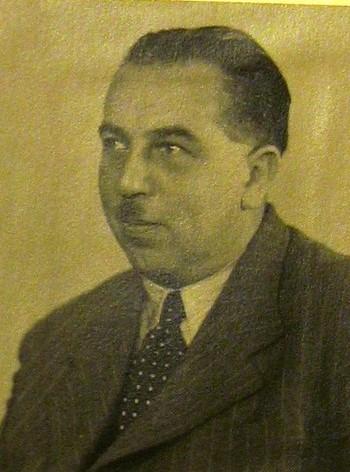After training as a cabinetmaker, Bernhard Witke ran a carpentry workshop at Mayerhofgasse 5 in Vienna’s 4th district,A member of the NSDAP and SA storm leader. since 1932/33, Witke was appointed temporary supervisor by the Property Transaction Office after the “Anschluss” of Austria on 28 May 1938 and temporary administrator of the art and antiques shop Josef Berger & Sohn (owned by Rudolf Berger) located at Mollardgasse 10 in Vienna’s 6th district, on 22 June 1938. He resigned from this position in September 1938 in order to officially “aryanize” the business. He was succeeded as temporary administrator by the art dealer Rudolf Raue. Together with the authorised signatory of the Berger company, Michael Oberhuber, who could not have taken over the company alone due to his lack of NSDAP membership, Witke received the approval of the Property Transaction Office for the “Aryanization” of the art dealership, now Oberhuber and Witke, in January 1939. He also “aryanized” a villa in Sauerbrunn and half of the property at Gumpendorferstraße 67 in Vienna’s 6th district, , formerly owned by Artur Wohl. In addition to managing his “aryanized” business, Witke acted as a appraiser for the Property Transaction Office and the Reichsstatthalterei (Group 10/11, Art and Furniture, including furniture from Jewish property in Burgenland and Niederdonau) and, from August 1940, for the Gestapo and the Vugesta. In 1942, Witke founded and managed the so-called "Möbelverwertungsstelle Krummbaumgasse”, located at Krummbaumgasse 8 in Vienna’s 2nd district, on behalf of the Gestapo and cooperated closely with the Central Office for Jewish Emigration. Together with the appraiser Anton Grimm, Witke “utilized” the household effects and luggage of - as the deputy head of the Gestapo headquarters stated - a total of 48,500 deported Jews and those persecuted by the Nazi regime for the benefit of the German Reich; Grimm took over the so-called “clearance” of the accommodations of those deported to the Polish General Government while Witke was responsible for the Viennese Jews deported to Theresienstadt. Countless works of art from expropriated property came into Witke's hands, for example from Oscar Bondy, Julius Priester, Paul Zsolnay, Josef Blauhorn, Jean Engel, Philipp Gomperz and Ernst Egger, furniture from Camilla Hochberg and Wilhelm Grundler and violins from the property of Berthold Storfer, who had been arrested as a “U-Boot” (member of the resistance) in 1943 and deported to Auschwitz. In addition to receiving a percentage share of the valuations and sales proceeds from the Vugesta and the "Möbelverwertungsstelle Krummbaumgasse”, Witke used his access to furniture, antiques and works of art to stock his own antique shop and enabled numerous Nazi profiteers, Gestapo officials and art dealers to obtain assets at low prices. The Oberhuber and Witke company maintained several warehouses in which the huge stock of goods was stored, including in Mariahilf, Vienna’s 6th district, and later in the Lower Austrian communities of Purgstall and Haag in connection with security measures against Allied air raids. "Möbelverwertungsstelle Krummbaumgasse” had around 15 storage depots in Leopoldstadt (Vienna‘s 2nd district) alone. In 1944, Bernhard Witke sold five art objects to the antiquities collection of the Kunsthistorisches Museum, the previous owners of which have not yet been identified.
At the end of the war, Witke fled to Enns in Upper Austria and was initially taken prisoner by the Allies. In May 1945, in Witke's absence, the People's Court in Vienna initiated proceedings against him, Michael Oberhuber, Anton Grimm and several Gestapo officers associated with Vugesta and the "Möbelverwertungsstelle Krummbaumgasse”. A commission set up by the provisional Austrian government to investigate suspected war criminals placed Bernhard Witke on the so called Fourth War Criminals List in June 1946. He was finally arrested by the state police on 6 September 1946 and was remanded in custody. In July 1948, the Vienna Regional Court ordered the seizure of his assets and on 12 January 1949, the People's Court sentenced him to 3.5 years in prison as well as forfeiture of assets for his illegal membership in the NSDAP before March 1938 (sections 10, 11 VG/prohibition act) and abusive enrichment (section 6 KVG/war crimes act). After his early release, he returned to his profession as a partner in the joinery Siedl & Witke at Mayerhofgasse 5 in Vienna’s 4th district in the 1950s. An application submitted by Witke in 1957 for the return of his assets affected by the forfeiture of assets in the course of the Nazi amnesty was rejected by the Vienna Regional Court. He died in Vienna in 1970.

